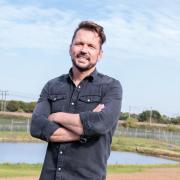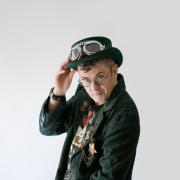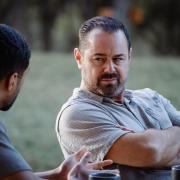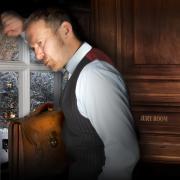Francis Wheen, Ian Hislop's right-hand man at Private Eye,
explains how Essex is better than the Cotswolds and why
he feels we have never left the 70s. Pat Parker reports
Wheen’s World
Francis Wheen, Ian Hislop’s right-hand man at Private Eye, explains how Essex is better than the Cotswolds and why he feels we have never left the 70s. Pat Parker reports
IN 1973, a 16-year-old Francis Wheen, the Harrow-educated son of an Army major, left his comfortable Chislehurst home, leaving a note for his parents which read, ‘I have gone to join the alternative society. Do not try to find me’.
Unfortunately, he was too late. The innocent idealism of the 1960s had gone sour. ‘I turned up at this hippie commune in London filled with enthusiasm, saying, “Let’s start the counter-culture!” but these hippies were lying around saying, “Drop back in, man, it’s all over”. Francis, writer, journalist, broadcaster and patron of the Essex Book Festival, has now written a book about the 1970s entitled, quoting John Lennon, Strange Days Indeed.
‘I’d been thinking of writing a book about the 70s almost since the 70s,’ Francis tells me as we sit in front of the fire at the ramshackle rural home near High Easter which he shares with his partner Julia Jones and their sons, Bertie, 14, and Archie, 13. ‘But I never did anything about it and then as the years went by, the decade just came to seem more and more bizarre.’
This was a time when IRA bombs were going off almost daily, the country was constantly on the brink of an industrial or financial crisis, we were plunged into darkness by the miners’ strike and several world leaders, including Richard Nixon, Chairman Mao and Harold Wilson were, according to Francis, ‘completely barking’.
It was, as the book’s subtitle says, the ‘golden age of paranoia’. Nixon’s paranoia is well-known, but Wilson’s perhaps less so. Wilson was convinced that Russian trawlers were spying on him in the Scilly Isles, that the CIA were plotting against him and that a bug had been planted behind a portrait of William Gladstone in the cabinet office. It turned out to be an old light fitting.
‘But just because he was paranoid didn’t mean they weren’t out to get him, because they were,’ explains Francis. ‘Private armies of captains of industry and retired generals were muttering about organising coups and establishing governments of national unity.’
You might think we would be happy to forget all about that miserable decade. But strangely, it has never been more fashionable. Whether it be Mamma Mia!, the Life on Mars TV drama or the Frost/Nixon movie, the 70s are all around us. Maybe it is because they bear a striking resemblance to the decade we have just lived through.
‘Outsiders have the idea that Essex is some kind of philistine, illiterate swamp. They couldn’t be more wrong. It’s extraordinary’
‘I think the Noughties will be seen in hindsight to be as gloomy as the 70s,’ says Francis. ‘The attacks of 9/11 cast a dark, baleful shadow and we have lived with the fall-out ever since. Then the recession kicked in at the end of the decade. There’s terrorism, economic crises, postal and rail strikes, nationalisation of the banks and apocalyptic warnings of climate change. It’s the 70s revisited.’
Francis had ambitions to be a journalist from the age of eight. Born in 1957, he spent his early childhood in Colchester, Catterick, Malaya and Glasgow, as his Army-major father was posted from place to place. He was packed off to prep school and then to Harrow, which he loathed. Many of Francis’s contemporaries were members of the landed gentry, but fellow students included Mark Thatcher and the director Richard Curtis, who worked with him on the school newspaper.
After he escaped Harrow to join the alternative society, his parents sent him to a crammer, where he had three months to revise for his A Levels. Having wanted to become a journalist since the age of eight, he then worked as a dogsbody on the Guardian before reading English at university. After graduating, he wangled a holiday job on the New Statesman, but set about making himself so indispensable, he was eventually taken on full time.
He quickly made a name for himself as an investigative journalist and was soon writing for other papers such as the Mirror, Guardian, Observer and Private Eye. In the 1990s, he had a popular weekly Guardian column called Wheen’s World.
Francis explains: ‘I did it for eight years, but then I went on holiday to Woodbridge in Suffolk for a week and it was so blissful not having the column hanging over me like a dark cloud that I rang up the editor and said I wanted to stop. He told me I must be having a mid-life crisis. For a year or so, they kept ringing me asking me when I’d come back. I think they’ve finally given up now.’
He joined Private Eye in 1986, at the invitation of the satirical magazine’s new young editor, Ian Hislop. Francis edits the magazine whenever Ian is away, but the two have very different editing styles. ‘I’m much quicker, which may not be a good thing. When I’m in charge it’s all off at the printers at 3.30pm and everyone’s pathetically grateful. But Ian, to his credit, agonises, trying to squeeze a quart into a pint pot. My approach is to say, “Well, let’s throw that in the bin, that clears that space and you’re done”!’
Private Eye suits him. ‘It’s wonderful – the only office I can bear working in. I loved the mayhem of newspapers in the old hot metal days, when you’d have typewriters and presses clattering away. Now you have fitted carpets, air conditioning and people transfixed behind their computer screens. Private Eye is moderately noisy and doesn’t have a tidy desk policy, thank goodness. There’s a piano in Ian’s room and we often gather round during joke sessions to have a sing-song.’
Francis has been a panelist on Radio 4’s The News Quiz almost as long as he’s been on Private Eye. He says it’s changed over the years, although he’s a great fan of the chairman, Sandi Toksvig.
‘When it started, the panelists tended to be mostly journalists. Nowadays, there are far more comedians and there’s more of a sense of them practising their stand-up routines. We sometimes try to sabotage them, interrupting just before they get to their punch line!’
He says they never get to see the questions in advance, unlike on TV’s Have I Got News For You. ‘They have a technical run-through where you see all the headlines and clips in advance. You don’t hear the questions, but you have a fair idea of what they might be and it means you can disappear with Paul Merton or Ian and talk it through.’
Over the past decade, Francis has won increasing acclaim as an author. In 1999, he produced a highly successful biography of Karl Marx. Then in 2004, he wrote How Mumbo Jumbo Conquered The World – a book which charts how since 1979, when the Ayatollah returned to Iran and Margaret Thatcher was swept into Downing Street, there has been a return to religious and economic fundamentalism. Other trends, such as a blind belief in the supremacy of the markets, new ageism, alternative therapies and postmodernism are all essentially, ‘anti-enlightenment, against progress and rationalism’. His latest book, Strange Days Indeed, is a sort of prequel to Mumbo Jumbo, explaining how we got to that state.
Francis moved to Essex in 1993 where he lives with Julia and their two boys, who attend Helena Romanes School in Dunmow, and a menagerie of cats, a dog and assorted horses and ponies. The family also own two boats moored at Woodbridge. Francis much prefers Essex to the Cotswolds, where he lived with his former wife, the feminist writer Joan Smith. ‘In Oxfordshire you had the sense of it being an annexe to Islington or Holland Park and it was swarming with journalists who you’d left London to get away from.’
Francis also finds that people often have a completely false impression of Essex. ‘I think they see it as a huge sprawling suburb of east London. I tell them that where I live it is very sparsely populated with wide open spaces and they don’t believe me. The Finchingfields and Bardfields, the Plesheys and High Easters are all unknown territory to them.’
As patron of the Essex Book Festival, Francis is also proud of this cultural icon for the county. ‘I go to literary festivals all over the country, and abroad, and I know of none which is as diverse as ours. It lasts a whole month and has events all over the county – even in schools and prisons. It reaches an incredibly wide range of people. Outsiders have the idea that Essex is some kind of philistine, illiterate swamp. They couldn’t be more wrong. It’s extraordinary how literary Essex really is.’
Inside Wheen’s World
For information about Francis Wheen, Julia Jones and their publications, go to www.golden-duck.co.uk


























